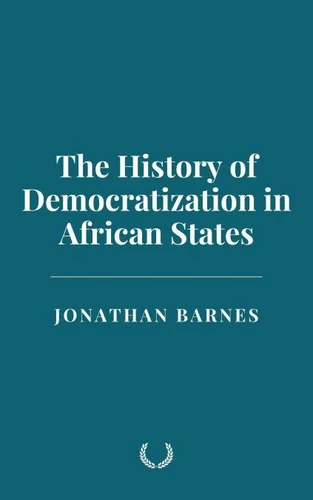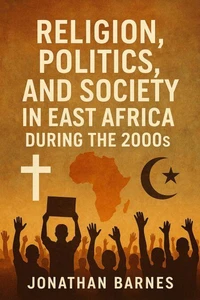The History of Democratization in African States
Par :Formats :
Disponible dans votre compte client Decitre ou Furet du Nord dès validation de votre commande. Le format ePub est :
- Compatible avec une lecture sur My Vivlio (smartphone, tablette, ordinateur)
- Compatible avec une lecture sur liseuses Vivlio
- Pour les liseuses autres que Vivlio, vous devez utiliser le logiciel Adobe Digital Edition. Non compatible avec la lecture sur les liseuses Kindle, Remarkable et Sony
 , qui est-ce ?
, qui est-ce ?Notre partenaire de plateforme de lecture numérique où vous retrouverez l'ensemble de vos ebooks gratuitement
Pour en savoir plus sur nos ebooks, consultez notre aide en ligne ici
- FormatePub
- ISBN8230934561
- EAN9798230934561
- Date de parution22/01/2025
- Protection num.pas de protection
- Infos supplémentairesepub
- ÉditeurIndependently Published
Résumé
This book explores the complex history and evolution of democratization in Africa, offering an in-depth analysis of the continent's political, social, and economic challenges and opportunities. It traces Africa's journey from the early post-independence period, characterized by the optimism of self-determination and the challenges of building new political systems, to the contemporary landscape, where issues of governance, electoral integrity, economic development, and regional cooperation remain central.
The book examines the influence of colonialism on Africa's political structures, highlighting the ways in which artificial borders and ethnopolitical divisions have fueled conflicts and hindered democratic progress. It delves into the era of authoritarianism, where many African leaders used coercion and repression to maintain power, and traces the shift toward multiparty systems and the growing demand for democracy in the late 20th and early 21st centuries.
The narratives of conflict and peacebuilding in countries such as Rwanda, South Africa, and Liberia reveal the resilience of African societies in the face of violence, while the successes and setbacks in countries like Ghana, Kenya, and Nigeria underscore the complexities of establishing free, fair, and inclusive elections. With an eye toward the future, the book examines the role of civil society, the media, and technology in shaping democratic engagement and accountability across the continent.
It discusses the potential of digital platforms for political mobilization, as well as the risks of digital authoritarianism. The book also analyzes the role of regional organizations such as the African Union (AU) and ECOWAS, which have contributed to peacebuilding and governance reforms, while acknowledging the difficulties in enforcing democratic principles at the regional level. Ultimately, the book presents Africa's democratization as a work in progress, one marked by significant challenges-such as weak institutions, corruption, and political instability-but also immense opportunities.
The analysis draws on primary sources, historical events, and the perspectives of key scholars and political actors, offering a comprehensive understanding of Africa's political landscape and the path toward a more democratic future.
The book examines the influence of colonialism on Africa's political structures, highlighting the ways in which artificial borders and ethnopolitical divisions have fueled conflicts and hindered democratic progress. It delves into the era of authoritarianism, where many African leaders used coercion and repression to maintain power, and traces the shift toward multiparty systems and the growing demand for democracy in the late 20th and early 21st centuries.
The narratives of conflict and peacebuilding in countries such as Rwanda, South Africa, and Liberia reveal the resilience of African societies in the face of violence, while the successes and setbacks in countries like Ghana, Kenya, and Nigeria underscore the complexities of establishing free, fair, and inclusive elections. With an eye toward the future, the book examines the role of civil society, the media, and technology in shaping democratic engagement and accountability across the continent.
It discusses the potential of digital platforms for political mobilization, as well as the risks of digital authoritarianism. The book also analyzes the role of regional organizations such as the African Union (AU) and ECOWAS, which have contributed to peacebuilding and governance reforms, while acknowledging the difficulties in enforcing democratic principles at the regional level. Ultimately, the book presents Africa's democratization as a work in progress, one marked by significant challenges-such as weak institutions, corruption, and political instability-but also immense opportunities.
The analysis draws on primary sources, historical events, and the perspectives of key scholars and political actors, offering a comprehensive understanding of Africa's political landscape and the path toward a more democratic future.
This book explores the complex history and evolution of democratization in Africa, offering an in-depth analysis of the continent's political, social, and economic challenges and opportunities. It traces Africa's journey from the early post-independence period, characterized by the optimism of self-determination and the challenges of building new political systems, to the contemporary landscape, where issues of governance, electoral integrity, economic development, and regional cooperation remain central.
The book examines the influence of colonialism on Africa's political structures, highlighting the ways in which artificial borders and ethnopolitical divisions have fueled conflicts and hindered democratic progress. It delves into the era of authoritarianism, where many African leaders used coercion and repression to maintain power, and traces the shift toward multiparty systems and the growing demand for democracy in the late 20th and early 21st centuries.
The narratives of conflict and peacebuilding in countries such as Rwanda, South Africa, and Liberia reveal the resilience of African societies in the face of violence, while the successes and setbacks in countries like Ghana, Kenya, and Nigeria underscore the complexities of establishing free, fair, and inclusive elections. With an eye toward the future, the book examines the role of civil society, the media, and technology in shaping democratic engagement and accountability across the continent.
It discusses the potential of digital platforms for political mobilization, as well as the risks of digital authoritarianism. The book also analyzes the role of regional organizations such as the African Union (AU) and ECOWAS, which have contributed to peacebuilding and governance reforms, while acknowledging the difficulties in enforcing democratic principles at the regional level. Ultimately, the book presents Africa's democratization as a work in progress, one marked by significant challenges-such as weak institutions, corruption, and political instability-but also immense opportunities.
The analysis draws on primary sources, historical events, and the perspectives of key scholars and political actors, offering a comprehensive understanding of Africa's political landscape and the path toward a more democratic future.
The book examines the influence of colonialism on Africa's political structures, highlighting the ways in which artificial borders and ethnopolitical divisions have fueled conflicts and hindered democratic progress. It delves into the era of authoritarianism, where many African leaders used coercion and repression to maintain power, and traces the shift toward multiparty systems and the growing demand for democracy in the late 20th and early 21st centuries.
The narratives of conflict and peacebuilding in countries such as Rwanda, South Africa, and Liberia reveal the resilience of African societies in the face of violence, while the successes and setbacks in countries like Ghana, Kenya, and Nigeria underscore the complexities of establishing free, fair, and inclusive elections. With an eye toward the future, the book examines the role of civil society, the media, and technology in shaping democratic engagement and accountability across the continent.
It discusses the potential of digital platforms for political mobilization, as well as the risks of digital authoritarianism. The book also analyzes the role of regional organizations such as the African Union (AU) and ECOWAS, which have contributed to peacebuilding and governance reforms, while acknowledging the difficulties in enforcing democratic principles at the regional level. Ultimately, the book presents Africa's democratization as a work in progress, one marked by significant challenges-such as weak institutions, corruption, and political instability-but also immense opportunities.
The analysis draws on primary sources, historical events, and the perspectives of key scholars and political actors, offering a comprehensive understanding of Africa's political landscape and the path toward a more democratic future.

















